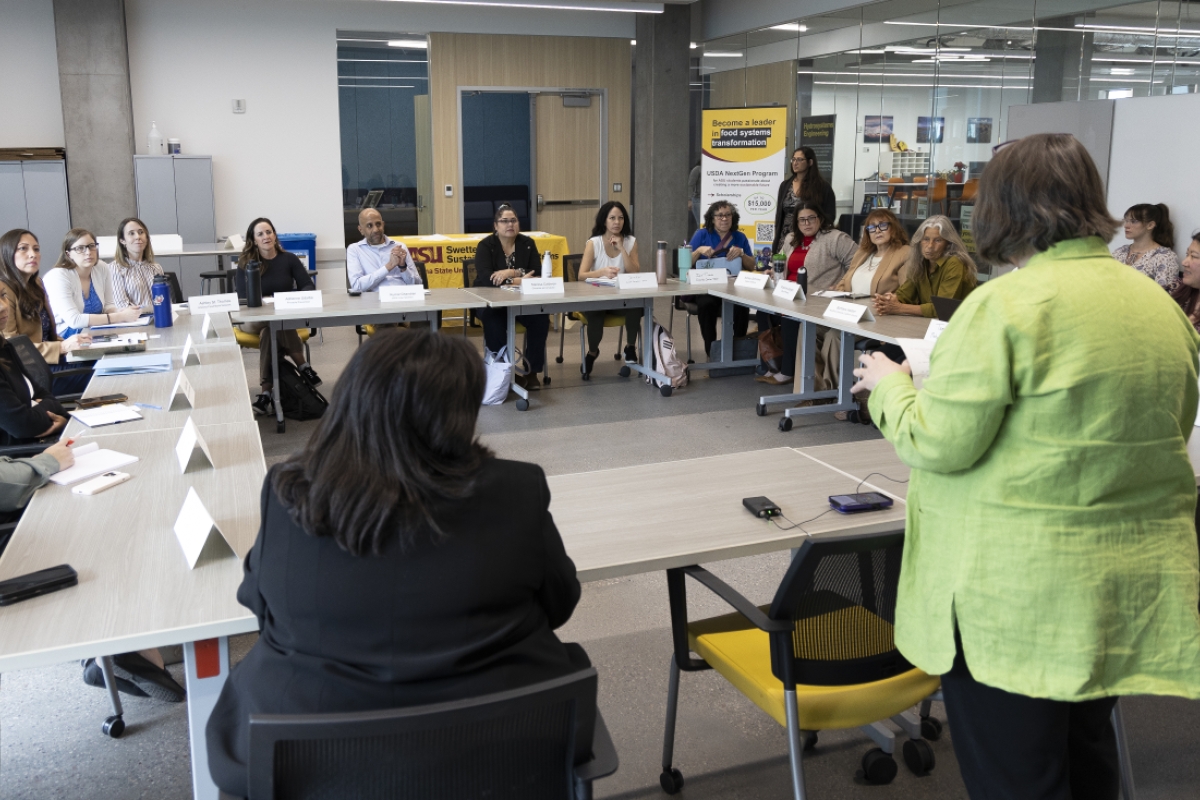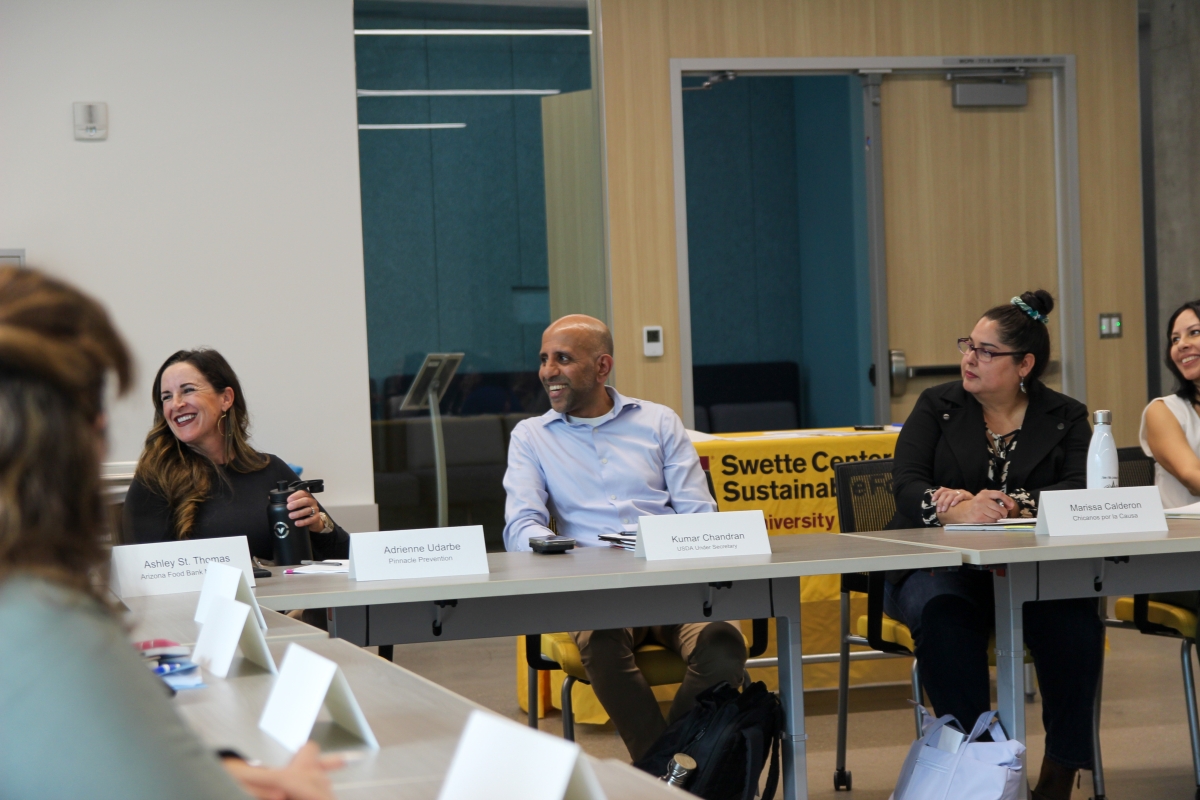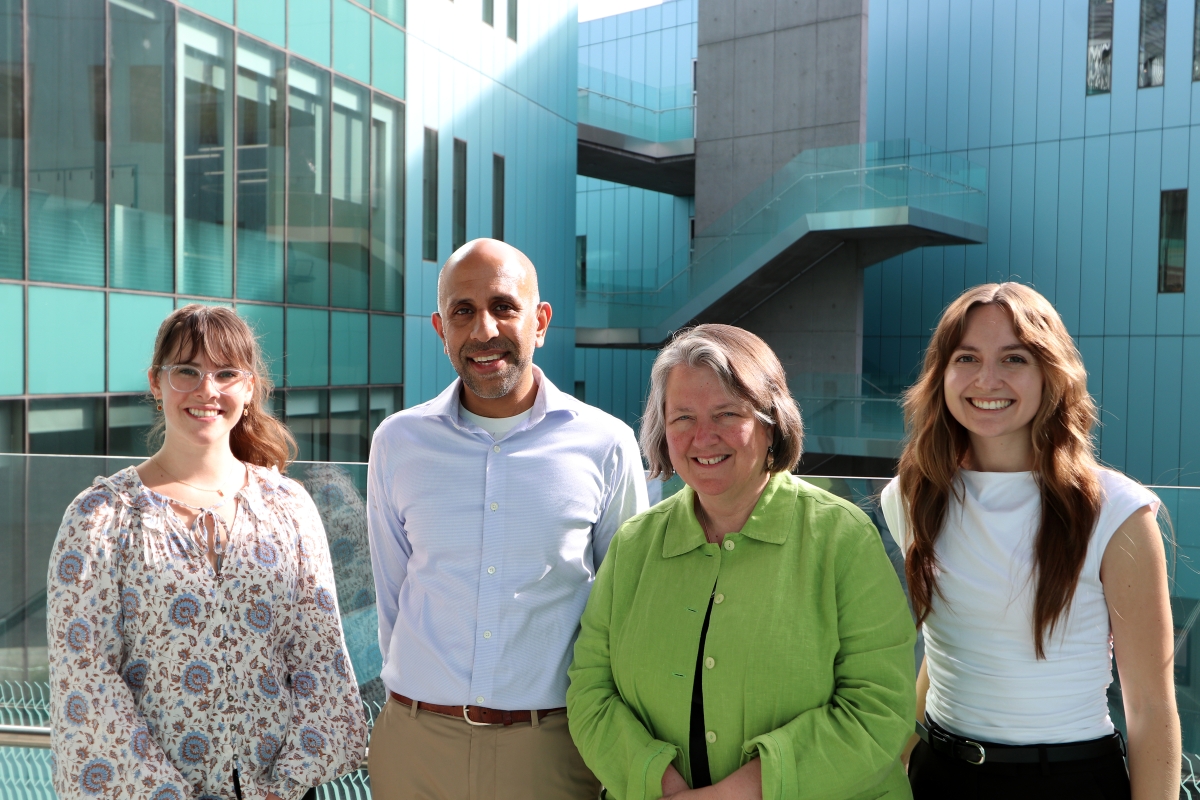USDA discusses nutrition security, healthy school meals with community at ASU

Kumar Chandran (left), United States Department of Agriculture Food, Nutrition and Consumer Services acting under secretary, and Kathleen Merrigan, executive director of Arizona State University's Swette Center for Sustainable Food Systems and professor of practice in the School of Sustainability and the College of Global Futures. Photo courtesy the College of Global Futures
On March 6, the Swette Center for Sustainable Food Systems at Arizona State University hosted Kumar Chandran, United States Department of Agriculture Food, Nutrition and Consumer Services acting under secretary, for a roundtable discussion focused on nutrition security and healthy school meals.
With an extensive background in nutrition advocacy, Chandran plays a critical role in the Biden-Harris administration’s health and nutrition initiatives.
“Under Secretary Chandran is an amazing advocate for healthy food in schools and policies to combat hunger,” said Kathleen Merrigan, who serves as executive director of the Swette Center for Sustainable Food Systems, a unit of the Julie Ann Wrigley Global Futures Laboratory, and is a professor of practice in the School of Sustainability, an academic unit of the College of Global Futures.
“It seems like yesterday when he sat in my classroom,” she continued. “Today, he oversees USDA programming that accounts for 70% of USDA’s $209 billion budget. I challenge my students to think big — Kumar certainly did, and we are all grateful for it!”
The visit is part of an ongoing effort from the National Strategy on Hunger, Nutrition, and Health to improve school meals through efforts like strengthening science-based nutrition standards in school meals, championing school districts that have exceptional food quality and assisting the improvement of nutritional quality in small and rural schools.
“USDA and the Biden-Harris administration are all in on setting up children to be healthy and thrive — and school meals are a proven tool for giving kids access to the nutrition they need for a bright future," Chandran said.
"This National School Breakfast Week, I’m grateful for the opportunity to meet with local leaders at ASU on their important work to improve educational and health outcomes through nutritious school meals.”
The roundtable, which took place at the Walton Center for Planetary Health, was organized by Merrigan and Sara El-Sayed, co-director of The Biomimicry Center and an assistant research professor within the School of Complex Adaptive Systems and the Swette Center for Sustainable Food Systems.
A group of over a dozen professionalsProfessionals came from such organizations as the Arizona Department of Education; United Way of Northern Arizona; Farm Services Agency (USDA); Chicanos por la Causa; American Heart Association; Federation of American Scientists & Food and Society at Aspen Institute; USDA AMS local and regional food systems; city of Phoenix; Partnership with Native Americans; Farm to School Network; Pinnacle Prevention; Healthful School Coalition Arizona (HSCA); Project Roots AZ; Arizona Food Bank Network Lutheran Advocacy Ministry Arizona (LAMA); Dairy Council of AZ; Shamrock Foods; ASPIN; and Concordia Charter School. within Arizona that work with food systems and school meals were invited to share their perspectives with Chandran. The topics largely touched on the current state of school meals and what is on the horizon in both Arizona and nationally.
“We shared our student-led study with USDA leaders, in which we found 27% of students in the College of Global Futures are or have been food insecure in the last 12 months,” said Merrigan, describing the capstone project from Master of Science sustainable food systems students participating in SFS 565: Organizational Leadership.
“This is shocking yet consistent with national data," Merrigan continued. "College hunger is a national problem, and we urged USDA to further address it.”
ASU was recently included in a partnership that was awarded an $18 million NextGen grant by the USDA to directly support future leaders of our food systems. Nearly $5 million is being used for student scholarship support and paid internships for sustainable food systems students within the School of Sustainability.
This academic year, the USDA NextGen grant has provided these opportunities to dozens of students.
“The goal is to build a pipeline of young, diverse workers for USDA — the future Kumar Chandrans of the world,” Merrigan said. “I’m all about getting my students food policy jobs. I’m proud that so many are in leadership positions at USDA.”
The Swette Center for Sustainable Food Systems plans to continue the discussion on food insecurity on college campuses during their March 26 table talk, offered both virtually and in-person at the Walton Center for Planetary Health.
Upcoming event
The Swette Center for Sustainable Food Systems plans to continue the discussion on food insecurity on college campuses during their March 26 table talk, offered both virtually and in-person at the Walton Center for Planetary Health.
More Environment and sustainability

ASU prof turns trash into treasure
The Research Corporation for Science Advancement, or RCSA, regularly hosts a series of discussions known as Scialog, a portmanteau of science and dialogue. Created in 2010, the Scialog format…

Best outdoor experiences are shared and build connections, recreation professor says
Steve Sassaman doesn’t really need to tell you he’s an outdoorsman. One look at his full, dark beard gives a vibe that clearly says he knows which end of the kayak to put into the water first.While…

ASU offers new project-based courses for global leaders of tomorrow
Addressing complex challenges requires innovative solutions.This is why the College of Global Futures — with its four academic units including the School for the Future of Innovation in Society, the…


